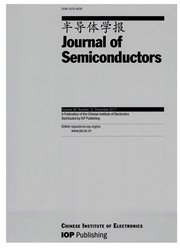

 中文摘要:
中文摘要:
We evaluated the TiN/TaN/TiAl triple-layer to modulate the effective work function (EWF) of a metal gate stack for the n-type metal–oxide–semiconductor (NMOS) devices application by varying the TiN/TaN thickness. In this paper, the effective work function of EWF ranges from 4.22 to 4.56 eV with different thicknesses of TiN and TaN. The thinner TiN and/or thinner in situ TaN capping, the closer to conduction band of silicon the EWF is, which is appropriate for 2-D planar NMOS. Mid-gap work function behavior is observed with thicker TiN, thicker in situ TaN capping, indicating a strong potential candidate of metal gate material for replacement gate processed three-dimensional devices such as FIN shaped field effect transistors. The physical understandings of the sensitivity of EWF to TiN and TaN thickness are proposed. The thicker TiN prevents the Al diffusion then induces the EWF to shift to mid-gap. However, the TaN plays a different role in effective work function tuning from TiN,due to the Ta–O dipoles formed at the interface between the metal gate and the high-k layer.
 英文摘要:
英文摘要:
We evaluated the TiN/TaN/TiA1 triple-layer to modulate the effective work function (EWF) of a metal gate stack for the n-type metal-oxide-semiconductor (NMOS) devices application by varying the TiN/TaN thickness. In this paper, the effective work function of EWF ranges from 4.22 to 4.56 eV with different thicknesses of TiN and TaN. The thinner TiN and/or thinner in situ TaN capping, the closer to conduction band of silicon the EWF is, which is appropriate for 2-D planar NMOS. Mid-gap work function behavior is observed with thicker TiN, thicker in situ TaN capping, indicating a strong potential candidate of metal gate material for replacement gate processed three-dimensional devices such as FIN shaped field effect transistors. The physical understandings of the sensitivity of EWF to TiN and TaN thickness are proposed. The thicker TiN prevents the A1 diffusion then induces the EWF to shift to mid-gap. However, the TaN plays a different role in effective work function tuning from TiN, due to the Ta-O dipoles formed at the interface between the metal gate and the high-k layer.
 同期刊论文项目
同期刊论文项目
 同项目期刊论文
同项目期刊论文
 期刊信息
期刊信息
